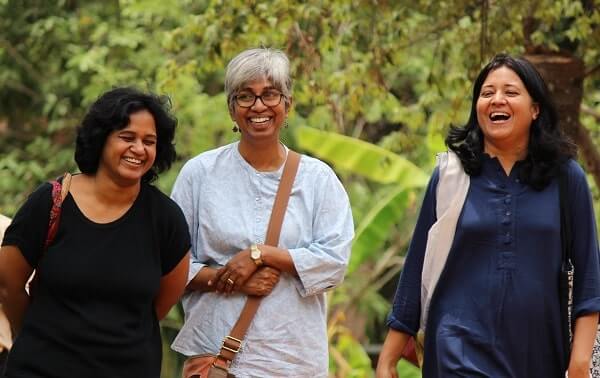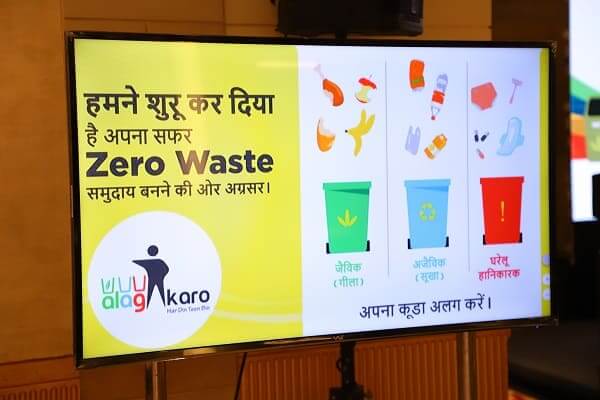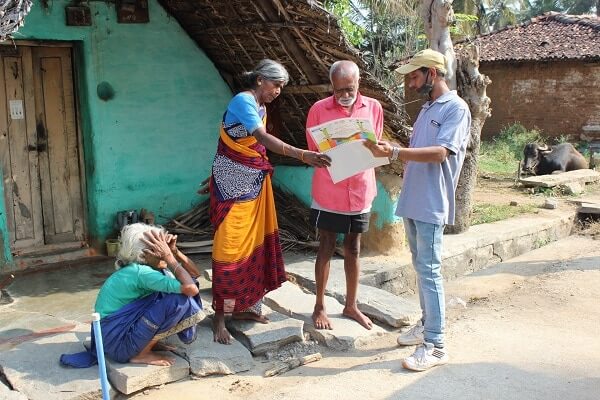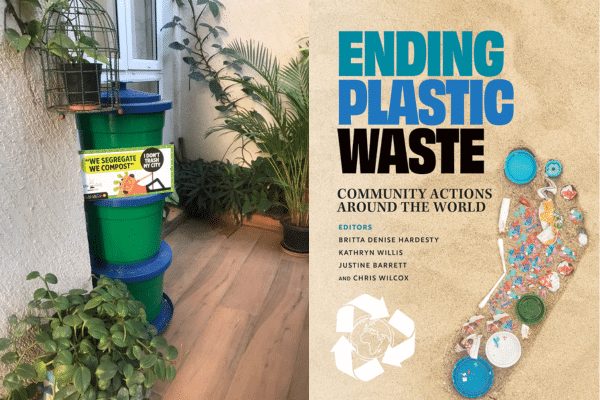Plastic pollution is making our oceans sick. Did you know that plastic waste generated in coastal regions is most at risk of entering the oceans? In 2010, the global coastal plastic waste – generated within 50 km of the coastline – was nearly 99.5 million tonnes.
Thanks to some plastic-fantastic initiatives carried out by individuals and organisations, there is hope for reducing waste globally. A new book titled, Ending Plastic Waste: Community Actions Around the World, highlights 19 such programs running across 15 nations.
The book, published by Australia’s national science agency CSIRO, mentions a non-profit organisation in Bengaluru called Saahas. Started in 2001 in the southern state of Karnataka, the mission at Saahas is to make India a leading circular economy, to emulate nature where nothing is wasted.
A year before Saahas was founded, the first municipal solid waste management rules were released in Bengaluru. “The rules talked about a three-way source segregation, focusing on waste as a resource and promoting minimisation of waste reaching the landfill,” shares Archana Tripathi, CEO, Saahas.

Mumbai-based journalist Wilma Rodrigues, who had moved to Bengaluru in 2000, decided it was the right time to start demonstrating how the waste management rules could be implemented.
“Bengaluru, in the late 1990s and early 2000s, was witness to a lot of citizen activism around waste management,” Tripathi recalls. “Wilma, too, got exposed to the non-profit sector.”
And so Saahas was born.
Saahas: Building a circular economy
Tripathi is an engineer by education. The desire to do work in the social sector was always there. So, after having worked in a telecom R&D firm for 21 years, she quit to start a new chapter of her life in 2015.
Tripathi first met Rodrigues at a summit in 2016. “Till then, I had never thought too much about waste, except wondering where the waste we put in our bins goes, and hoping that someone must be taking care of it. But Wilma’s talk opened my eyes to the huge problem of waste and how Saahas was working to tackle it,” Tripathi remembers.
She expressed her desire to join Saahas and was hired as Director (Programs).

Saahas’s first campaign was called ‘Less Plastic for Me’, and was around elimination of plastic carry bags. Over the years, the team focussed on setting up on-site waste management systems.
“In mid-2000, Wilma convinced a manager of the SBI headquarters on St Marks Road that they should set up a composting unit and a dry waste sorting unit in the campus to manage their waste scientifically instead of burning it. The bank agreed to pay a fee for Saahas to set up an on-site waste management system.”
This is how the service fee model came into being. “It showcased that proper waste management is a service, like water and electricity, and a service fee is required to manage it well without negative social and environmental impact,” Tripathi explains.
Since then, Saahas has continued to provide on-site waste management services to corporates and commercial establishments in different part of Bengaluru, apart from carrying out awareness campaigns around source segregation and waste reduction, and studies on the e-waste sector.

Saahas: The Udupi initiative
But it is the organisation’s ‘Mission Swachha Udupi’ that has particularly received praise in CSIRO’s book.
Tripathi informs, “It is one of our most successful interventions, as we were able to work across the city and got support from the municipality and the community.”
Started in 2018, the Mission is a collaboration between Saahas, the municipality in Udupi and self-help groups within Udupi city. Udupi is located over 400 km from Bengaluru city.
“We helped improve resource recovery through improvement in source-segregation of waste, better monitoring of collection, setting up decentralised processing facilities, and engaging different sections of the community. We carried out extensive awareness campaigns in residential and commercial areas, schools, colleges and public places. We conducted events with the sanitation staff to bring them visibility and respect. Solutions for specific waste streams like flower waste, meat waste and coconut shells were demonstrated. A trash barrier was tried out to prevent plastic waste from flowing into the ocean. A data capture app was also piloted along with the municipality to track waste collection routes of the vehicles.”
So, how do self-help groups, including women, benefit under this initiative? “The SHGs in Udupi have been into waste collection for many years, even before Saahas started working there. They have been given 27 of the 35 wards to collect waste and charge a user fee from waste generators. After our intervention and support, they have been able to get good quality segregated dry waste and their income from sale of waste has increased.”
Under the Mission, about 13-15 tonnes per day (TPD) of dry waste is collected in Udupi. “About 25-30 TPD of organic waste is collected; some of which goes to a biogas plant and the rest goes to the windrow composting facility. And 1-2 TPD of domestic hazardous waste goes to the landfill.”
The Saahas team is now working to replicate the Udupi project in Tamil Nadu’s Trichy and Jorhat town in Assam.
READ ALSO: CSIRO spotlights Pune’s SWaCH program




